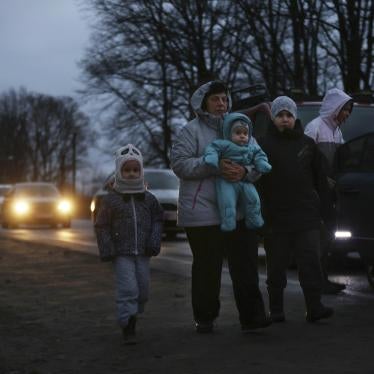(Brussels) – The European Union and its member states should do everything they can to ensure safe passage and fair treatment for all civilians fleeing Ukraine, Human Rights Watch said today. Justice and home affairs ministers meeting on March 3-4, 2022, should endorse a holistic plan of action that includes measures to ensure access to territory, protection, and support for everyone escaping the war.
“We’ve seen a swift and encouraging show of solidarity with Ukrainians, and we applaud the EU’s readiness to streamline access to sanctuary through the EU’s Temporary Protection Directive,” said Judith Sunderland, associate Europe and Central Asia director at Human Rights Watch. “It’s vitally important for all EU states and institutions to work to help everyone, including non-Ukrainians, reach safety, and get the care, protection, and assistance they need.”
Hundreds of thousands of people have fled their homes in Ukraine since the full-scale Russian invasion began on February 24. According to the United Nations High Commissioner for Refugees (UNHCR), as of February 28, over 500,000 people had fled to neighboring countries and 100,000 had been displaced within Ukraine. UNHCR has called on all receiving countries to welcome everyone fleeing conflict and insecurity in Ukraine “irrespective of nationality and race.”
Human Rights Watch and others have documented serious violations of the laws of war by Russian forces, including the use of cluster munitions that hit a hospital and a preschool. According to the United Nations, civilian casualties from the first four days of the conflict are at 406, including 102 deaths.
EU countries neighboring Ukraine – Poland, Hungary, Slovakia, and Romania – should not be expected to assume all responsibility for refugees from Ukraine. Arrangements should be made to ensure an equitable sharing of responsibility by all member states, including via an efficient and fair relocation plan that takes into account family ties and, insofar as possible, individual preferences.
It is vitally important for all countries neighboring Ukraine to allow everyone to enter with a minimum of bureaucratic procedures. Those with friends or family with whom they can stay should be allowed to proceed to those destinations, and individuals and families in need of accommodation should have access to dignified and adequate housing. Crucial services such as health care, including mental health care, and support services for children should be made available, and they should be able to resume their education as soon as possible.
These conditions should apply equally to Ukrainians and non-Ukrainians fleeing the conflict, Human Rights Watch said. EU member states and institutions should clarify to Ukrainian authorities that they will accept all civilians leaving Ukraine, without distinction, and actively work with Ukrainian authorities to ensure that people can exercise their right to leave without unnecessary delay and to facilitate transit and access to EU territory.
Human Rights Watch has spoken with foreign nationals who said Ukrainian authorities prevented them from boarding evacuation trains or stopped them from reaching the border to make way for Ukrainian women and children. The African Union issued a statement on February 28 urging “all countries to respect international law and show the same empathy and support to all people fleeing war notwithstanding their racial identity.” There are reports also of some foreign nationals facing problems at EU borders. On March 1, while commending neighboring countries for keeping their borders open, UNHCR said it was “aware of challenges faced by some third country nationals seeking to enter Poland.”
The likely move to invoke the Temporary Protection Directive is positive, Human Rights Watch said. This would be the first time the EU has triggered the directive, adopted in 2001 in the aftermath of the refugee movements caused by the war in the former Yugoslavia. The directive would allow for streamlined, blanket protection for up to three years to people displaced by the war in Ukraine and unable to return to their country of origin. EU member states and institutions should ensure that non-Ukrainians in a similar situation are afforded the same protection and rights, and that all non-Ukrainians leaving Ukraine are given access to EU territory and that their rights and dignity are respected. Nationals of other countries fleeing Ukraine who wish to return to their countries of origin should receive appropriate assistance to do so.
EU countries should also secure the status of Ukrainians already on their territory. This includes migrant workers on temporary work visas as well as Ukrainians slated for return to Ukraine. Any Ukrainian national in detention pending deportation should be released. All EU member states that have designated Ukraine a “safe country” on a list of safe countries for the purpose of returns should amend the list to reflect the dramatic change in circumstance.
“This is a landmark moment for Europe, and an opportunity for the European Union to remedy the wrongs of the past and rise to the occasion with genuine compassion and solidarity,” Sunderland said. “That requires a truly collective commitment to keeping the door and our hearts open to everyone fleeing Ukraine.”








